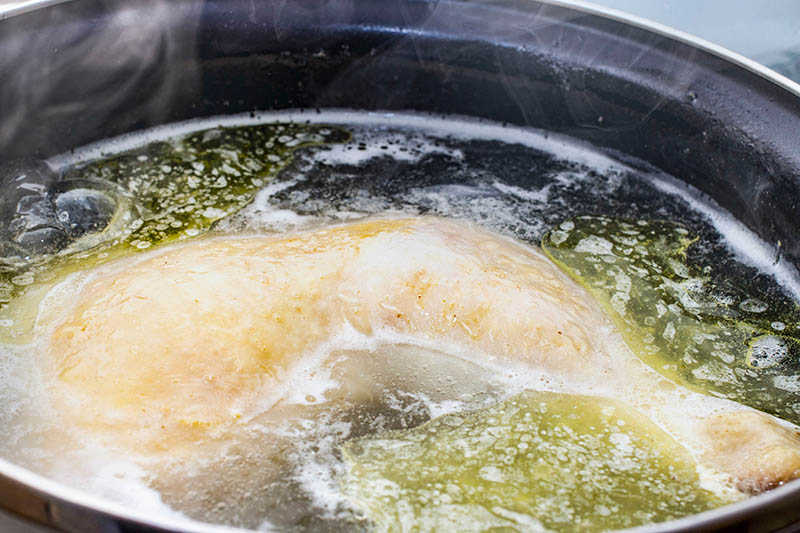Hyperthyroidism can be a heavy diagnosis to get your head around. Once you learn about an overactive thyroid, you realize that certain changes may need to take place with what your cat eats. Your vet will likely give you recommendations on what you should do for their everyday diet.
But if you’re looking for ways to increase their nutrition intake and want to avoid food items that could cause problems or complications, cooked chicken is a perfect choice. It is a very healthy additive to any cat’s diet, including those with hyperthyroidism, as long as your cat isn’t allergic to chicken. Let’s discuss the details.

Check with Your Vet
In this article, we will explain why chicken can enhance your cat’s diet when they have hyperthyroidism. However, anytime you make a change to your cat’s diet, you should always speak with your veterinarian first, especially if your cat has been diagnosed with a medical condition.
If the vet has your cat on a special dietary regimen, or if your cat has other health conditions, adding in other food items can disrupt the progress and actually make things worse. So, before you add cooked chicken to your cat’s diet, it’s always a good idea to check with them first.
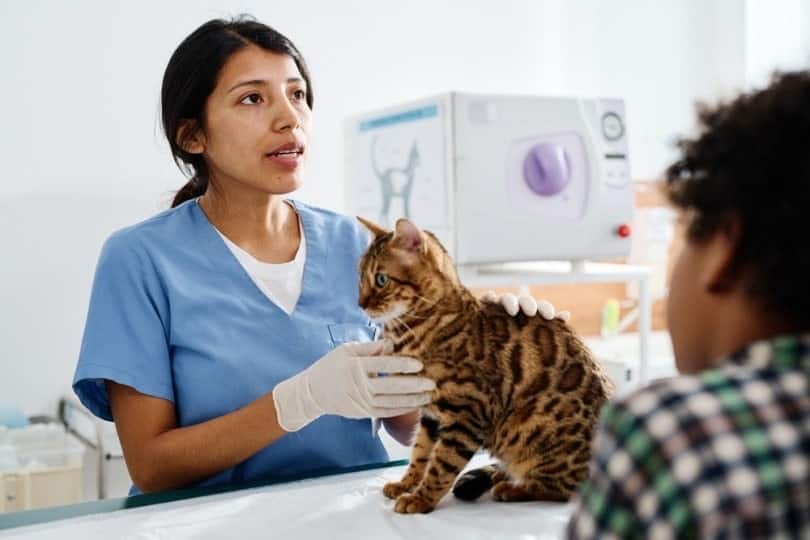
Hyperthyroidism and Diet
Hyperthyroidism is a common condition of cats over 10-12 years old. It is caused by excess thyroid hormone production, causing a series of problematic side effects. The exact way in which hyperthyroidism develops is not fully understood, but there is evidence to suggest that it may be linked to deficiencies of certain nutrients, or exposure to specific elements or chemicals in food or the environment.
Recently, studies have suggested that ring-pull tins and fish flavored cat foods may increase the risks of hyperthyroidism.
There are a number of ways in which this condition can be treated or managed, from medication, dietary therapy, and surgery. Another treatment is using radioactive iodine to target and destroy all thyroid tissue. Ultimately, it will depend on your individual cat’s specific circumstances and overall health.
Food, specifically protein, can play a direct role in thyroid function, so it is crucial to get your cat on a proper diet. In most cases, chicken is an ideal option.
Avoiding Certain Foods with Hyperthyroidism
Your vet has likely already explained that avoiding certain foods when your cat has a thyroid condition is paramount. You should avoid feeding your cat certain ingredients that can further disrupt thyroid function.
- Soy: Soy is a plant-based product often found in many commercial cat foods. Soy can make it harder for your cat to take in radioactive iodine used for treatment.
- Fish: Even though it’s a kitty favorite, fish contains too much iodine that can interfere with hormone production, and has been linked to the development of the condition.
- High iodine items: Food high in iodine exacerbates hyperthyroidism by causing the thyroid to produce too much hormone.
Why Is Chicken Beneficial for Cats with Hyperthyroidism?
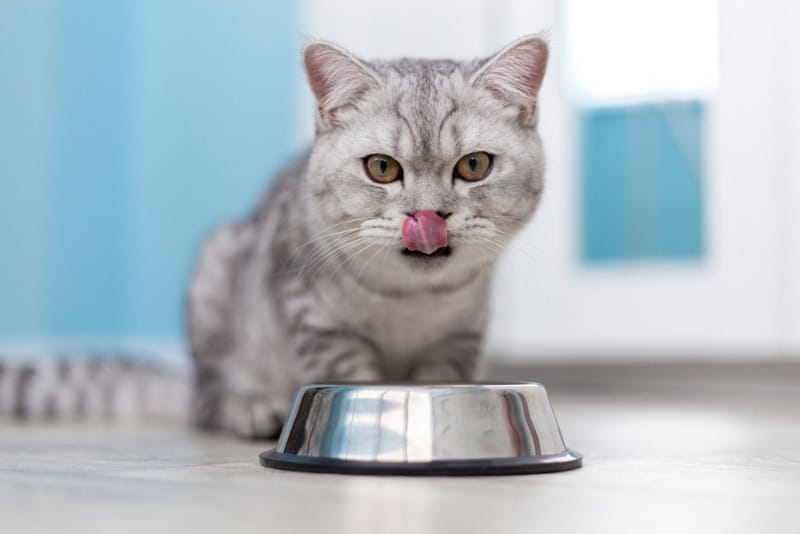
Chicken is a protein-rich, lean meat that is healthy for thyroid function. Protein is essential for the proper function of the thyroid gland. In addition to contributing to the proper production of thyroid hormone, chicken has numerous other health benefits for most cats.
However, chicken is a common trigger for cats with food allergies and sensitivities, so will not be right for these cases.

Health Benefits of Chicken for Cats
Chicken can benefit any cat, not just those with hyperthyroidism. In addition to providing an adequate protein source that helps nourish the thyroid and produce proper hormones, chicken can also offer the following nutrients:
1. Omega Fatty Acids
Omega-3 and omega-6 fatty acids can help nourish your cat’s skin and coat. These are very important areas when your cat has hyperthyroidism, as their fur often becomes dull and brittle. Enhancing their diet with omega-rich content will create a shinier, healthier coat.
2. Glucosamine
Chicken contains glucosamine, which helps maintain healthy bones, cartilage, and joints.
3. B Vitamins
B vitamins like B6 and B12 are essential for your carnivorous cat. They play a vital role in releasing energy from carbohydrates and fat in the diet, breaking down amino acids, and transporting oxygen nutrients throughout the body.
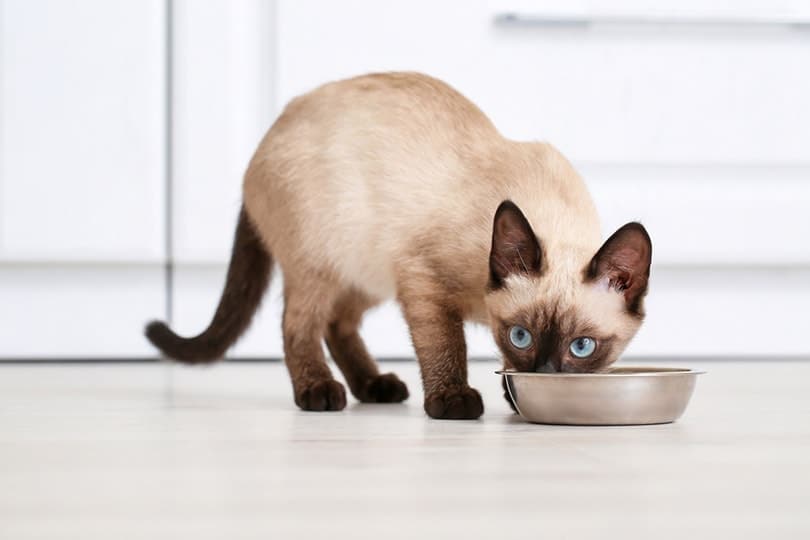
4. Zinc
Zinc supports immune function, and even a mild deficiency can have a significant impact on your cat’s immune response.
5. Iron
Iron plays a major role in making hemoglobin and myoglobin—two proteins that work in the red blood cells to carry oxygen to all body parts.
6. Phosphorus
Phosphorus has important roles in DNA synthesis, bone and teeth health, and metabolism.

Do Not Feed Chicken Solely
It is essential to understand that even though chicken is a very healthy additive to the diet of a hyperthyroid cat, it isn’t a standalone food item. It should be only part of a nutritionally balanced diet.
If you only give your cat cooked chicken, it can lead to nutritional deficiencies down the line. In particular, taurine, which is an essential amino acid that cats cannot synthesize themselves. Although animal protein, like chicken, contains some taurine, cats need a wider mix of ingredients to ensure they get the right amount each day. Liver contains the highest amount of taurine, which is why it is a common ingredient in cat food.
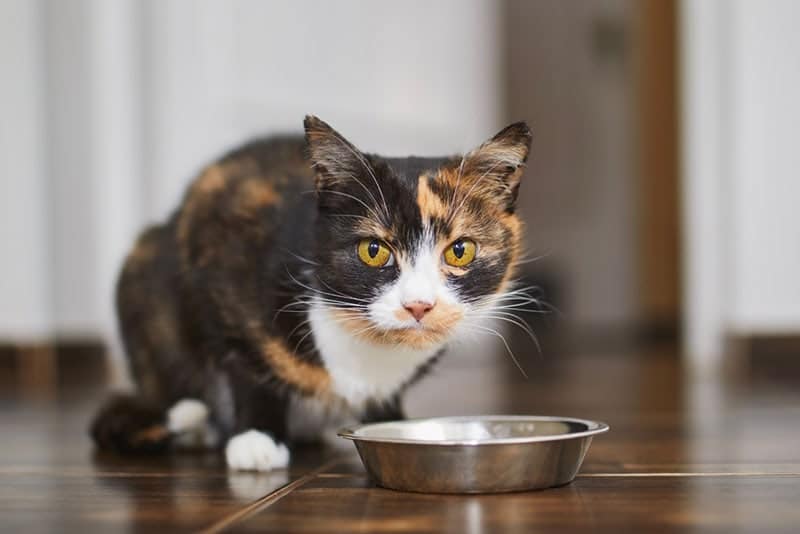
How To Prepare and Offer Cooked Chicken
Once you have been given the green light by your vet, you might want to know how much chicken you should offer your cat, and how to prepare it. If your cat has not eaten cooked chicken before, it is always a good idea to start slowly in case they have any adverse reactions.
The easiest and safest way to prepare chicken for your cat is to boil it. This can be done in a pot on the stove, or a microwave safe dish in the microwave. Take one chicken breast and cut it into 1 inch pieces, then cover with water, and boil until the meat is cooked through. Be sure to carefully cut open the pieces to make sure all the pink is gone. Allow the chicken to cool thoroughly.
Break the pieces into strips around half an inch wide, and offer 1-2 the first time. If your cat shows no signs of an upset tummy or itchy skin, you can increase gradually to 4-5 strips per day. Keep any leftovers covered and in the fridge for up to 3 days, and do not freeze the chicken once cooked.
Keep individually wrapped chicken breasts in your freezer to thaw out as needed.
Can I Still Feed Dry Kibble?
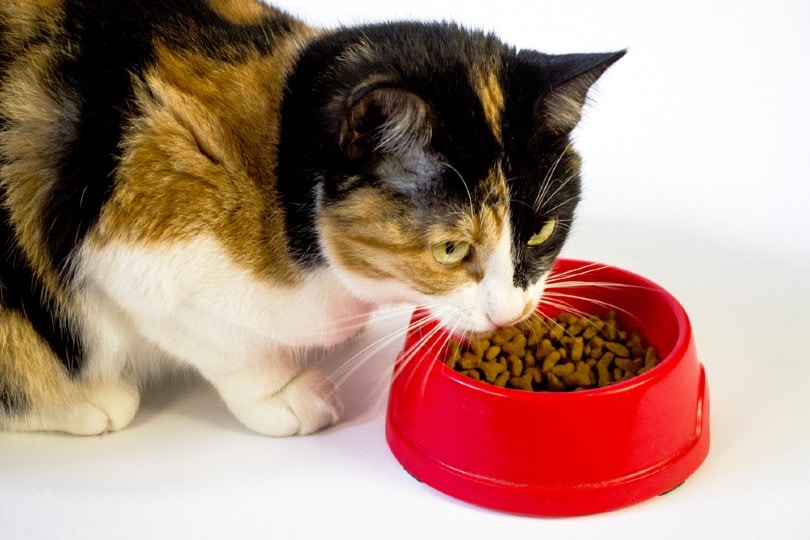
For cats with hyperthyroidism, high quality, readily available protein is key. Some dry kibble diets, particularly those designed for hyperthyroid cats, are absolutely fine to use. However, lower quality dry foods are often high in ingredients like corn meal, wheat, or flour, which are not necessary for cats, and not easily digested. Talk to your vet about what options are best if you want to keep your kitty on a dry food diet.

Conclusion
Remember, before you make any changes to your cat’s diet, always check with your veterinarian to ensure that it works with the plan for your cat’s overall health.
Chicken can be a very helpful and healthy additive for cats with hyperthyroidism, and one that they will almost certainly enjoy.
Featured Image Credit: Denis Torkhov, Shutterstock

